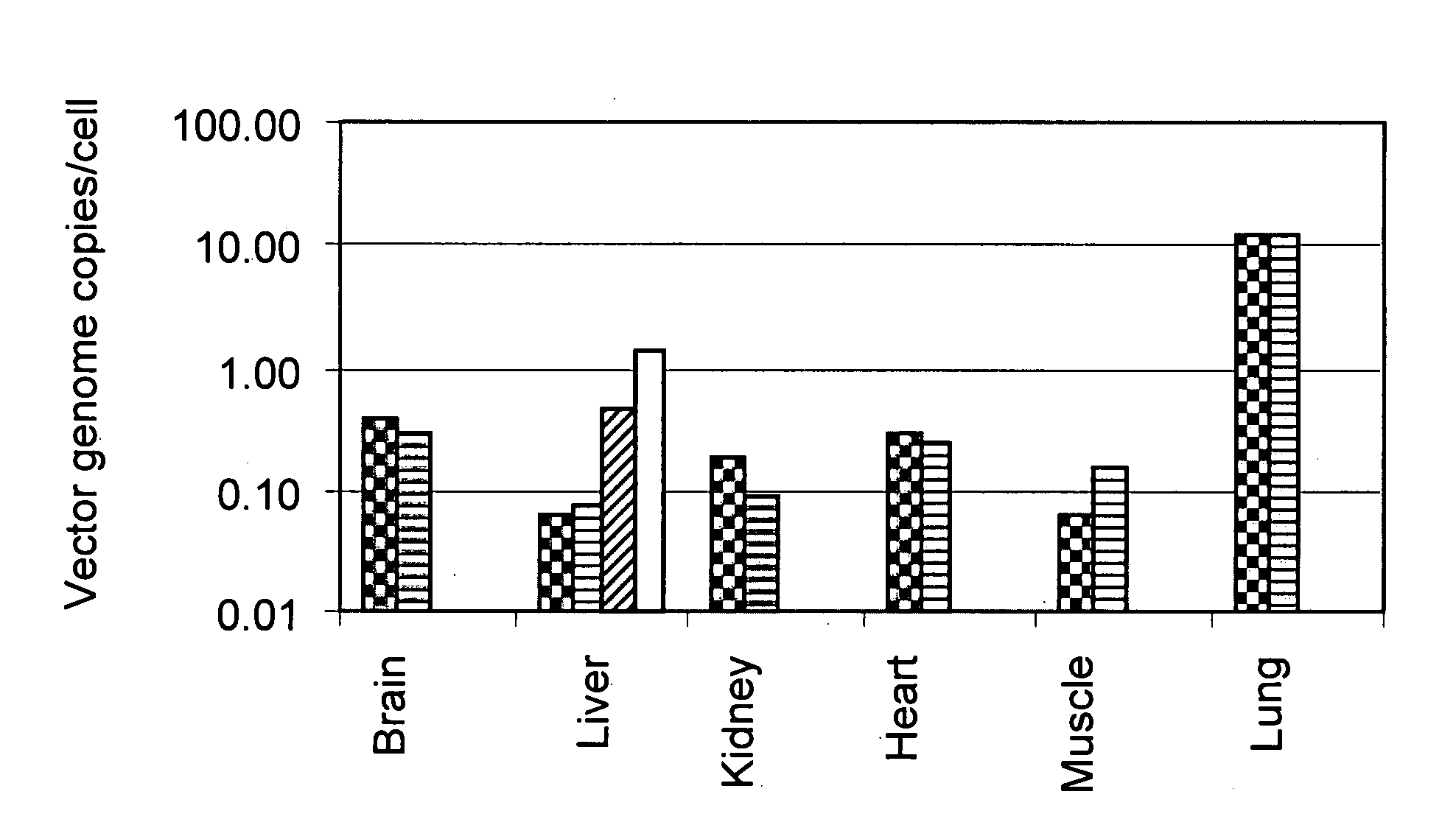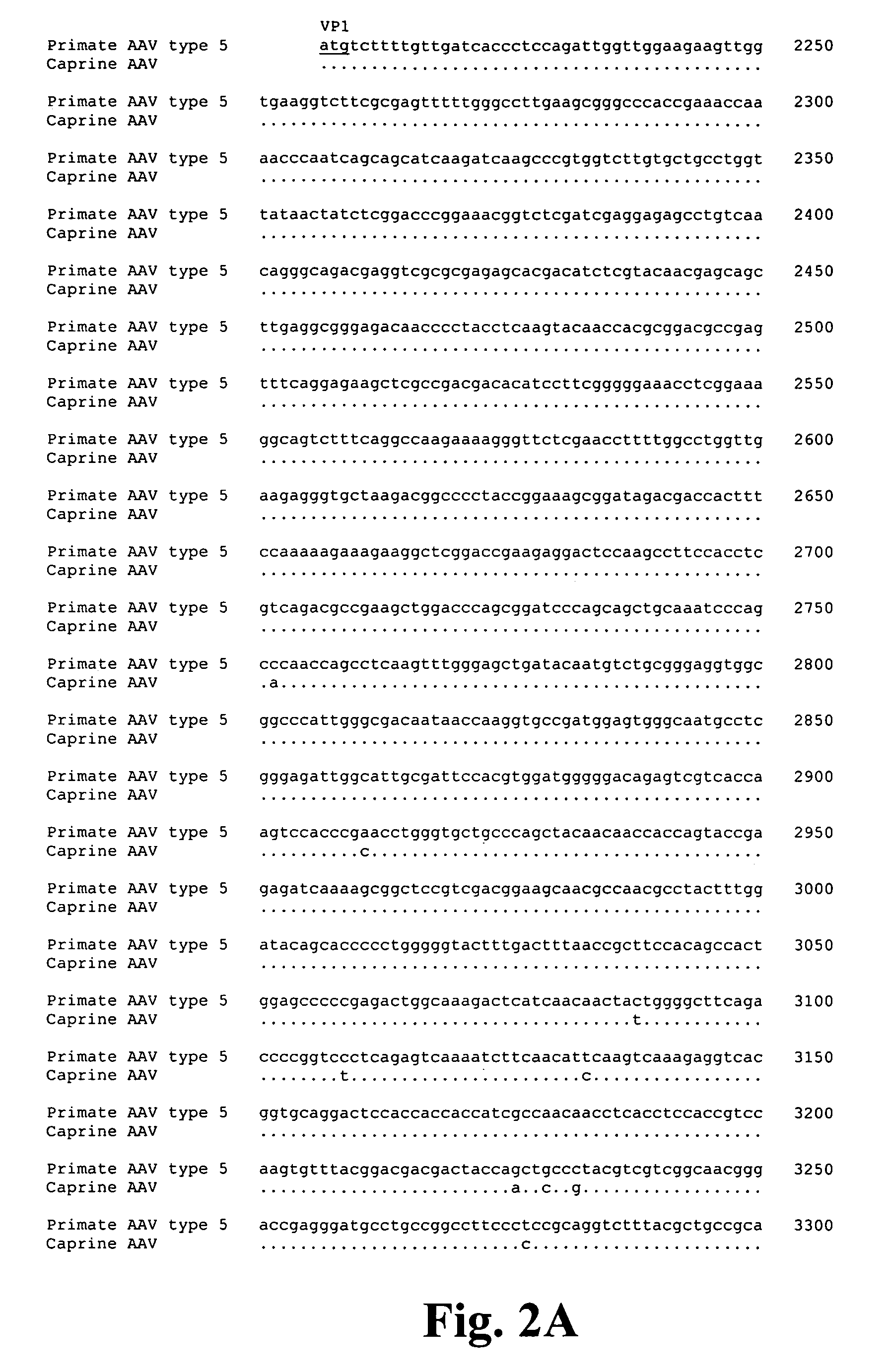AAV vectors for gene delivery to the lung
a gene and vector technology, applied in the direction of biocide, genetic material ingredients, drug compositions, etc., can solve the problems of inability to further replicate and package their genomes, inability to deliver in vivo gene delivery, and limited treatment options for individuals with cf, so as to reduce immunoreactivity, facilitate administration, and efficiently transduce lung cells and tissues
- Summary
- Abstract
- Description
- Claims
- Application Information
AI Technical Summary
Benefits of technology
Problems solved by technology
Method used
Image
Examples
example 1
Isolation and Characterization of a Caprine AAV
A. Cell Culture and Virus Isolation
[0111]Ovine adenovirus preparations with evidence of parvovirus contamination were isolated from caprine ileum as follows. Tissue was homogenized in Eagle's MEM medium containing Earles salts (pH 7.2) and gentamicin. The homogenate was clarified by low speed centrifugation (1,500×g) for 20 minutes and filter-sterilized though a 0.45 μm device. Supernatant (500 μl) was inoculated onto a 25 cm2 flask containing primary cultures of fetal lamb kidney cells at passage 3 and incubated with fetal bovine serum (USA) and lactalbumin hydrolysate (USA) at 37° C. in humid, 5% CO2 incubator for one week. Cells were trypsinized, split, and incubated again as described above and finally assayed for typical adenoviral cytophatic effect (CPE). Flasks showing CPE were frozen at −70° C., thawed and layered onto other cell types. These flasks were later incubated and tested for CPE.
[0112]Other cell types used included non...
example 2
[0124]In order to determine the biodistribution of vector genomes derived from caprine AAV following administration, the following experiment was conducted. Male SCID mice (15-25 g) were injected via the tail vein with 5×1011 vector genomes of caprine rAAV hF.IX (also referred to as rAAV-G1 hF.IX). In particular, the virions were generated using plasmid pAAV-hFIX16, containing the human factor IX gene under the control of a liver-specific promoter (described in Miao et al., Mol. Ther. (2000) 1:522-532). Plasmid pAAV-hFIX16 is an 11,277 bp plasmid encoding a human Factor IX minigene. In this construct, the FIX cDNA is interrupted between exons 1 and 2 with a deleted form of intron 1 that has been shown to increase expression of FIX. FIX expression is under the transcriptional control of the ApoE hepatic control region (HCR) and the human alpha 1 antitrypsin promoter (hAAT), as well as a bovine growth hormone polyadenylation signal (gGH PA). The backbone of ...
example 3
Isolation of a Bovine AAV
Materials and Methods
[0128]Bovine AAV was isolated as follows. Bovine adenovirus (BAV) type 8, strain Misk / 67 (available from the ATCC, Manassas, Va., Accession No. VR-769) isolated from calf lungs, was processed for DNA extraction. Virus-containing supernatant was treated with proteinase K (200 μg / ml) in digestion buffer (10 mM Tris-HCl (pH 8.0), 10 mM EDTA (pH 8.0) and 0.5% SDS) and incubated at 37° C. for 1 hour. Following phenol / chloroform extraction and ethanol precipitation, the viral DNA was resuspended in TE.
[0129]Oligonucleotide primers for PCR screening were selected on the basis of sequence alignments from segments that are highly conserved among known AAVs.
[0130]The forward primer 5′-GTGCCCTTCTACGGCTGCGTCAACTGGACCAATGAGAAC TTTCC-3′ (SEQ ID NO:11) is complementary to the helicase domain of rep and the reverse-primer 5′-GGAATCGCAATGCCAATTTCCTGAGGCATTAC-3′ (SEQ ID NO:12) is complementary to one of the several DNA binding domains in capsid. The expec...
PUM
| Property | Measurement | Unit |
|---|---|---|
| pH | aaaaa | aaaaa |
| pH | aaaaa | aaaaa |
| concentration | aaaaa | aaaaa |
Abstract
Description
Claims
Application Information
 Login to View More
Login to View More - R&D
- Intellectual Property
- Life Sciences
- Materials
- Tech Scout
- Unparalleled Data Quality
- Higher Quality Content
- 60% Fewer Hallucinations
Browse by: Latest US Patents, China's latest patents, Technical Efficacy Thesaurus, Application Domain, Technology Topic, Popular Technical Reports.
© 2025 PatSnap. All rights reserved.Legal|Privacy policy|Modern Slavery Act Transparency Statement|Sitemap|About US| Contact US: help@patsnap.com



